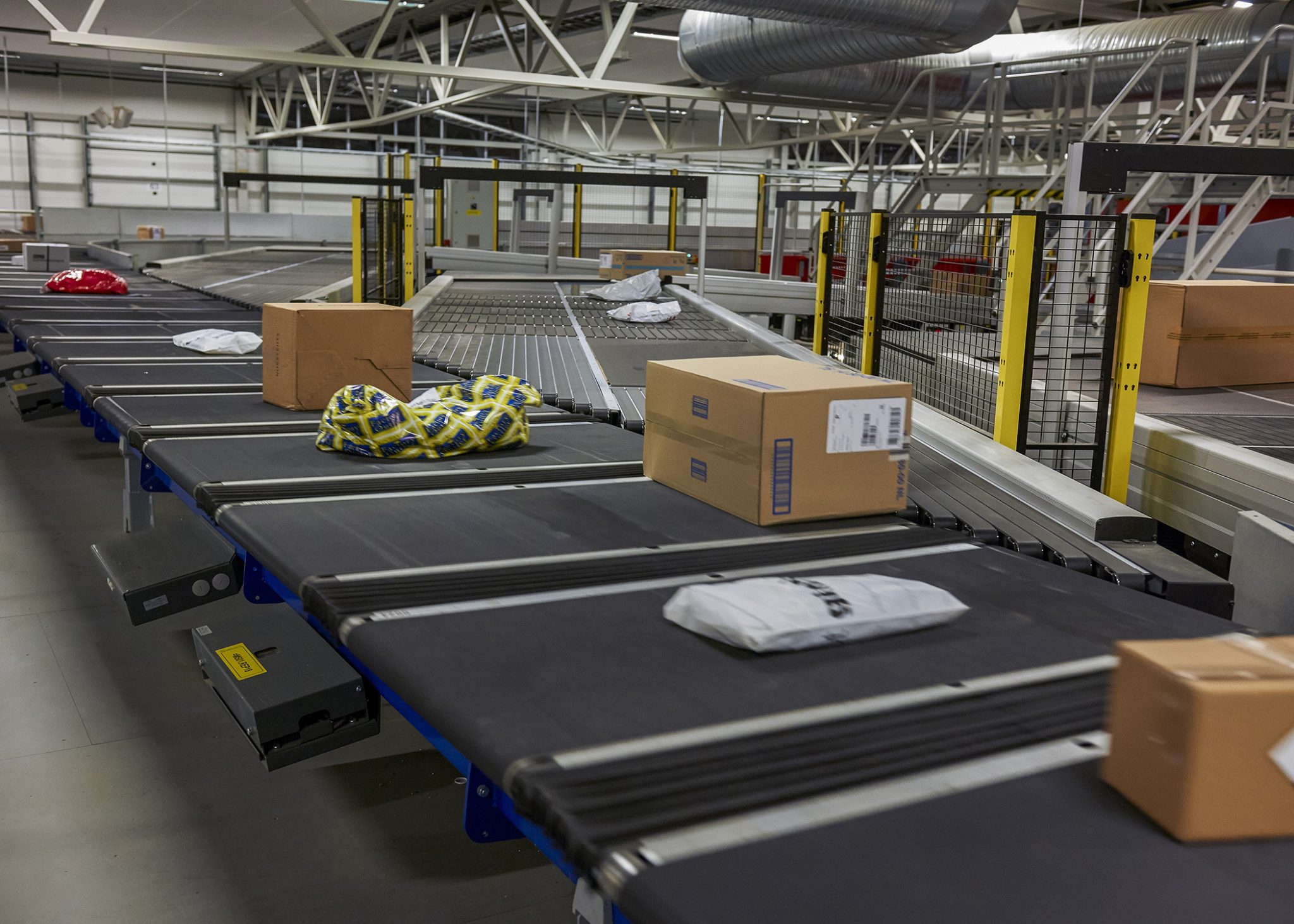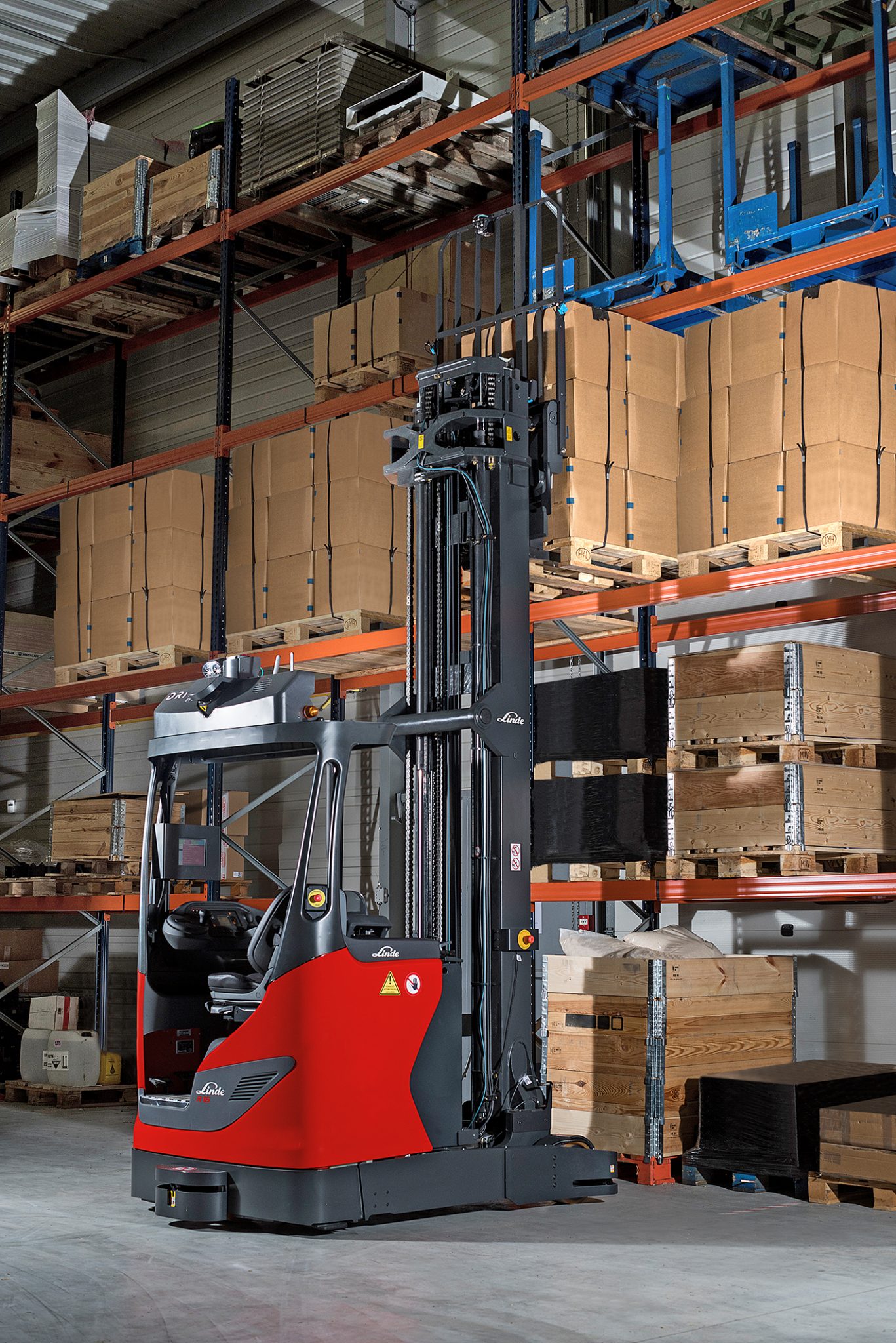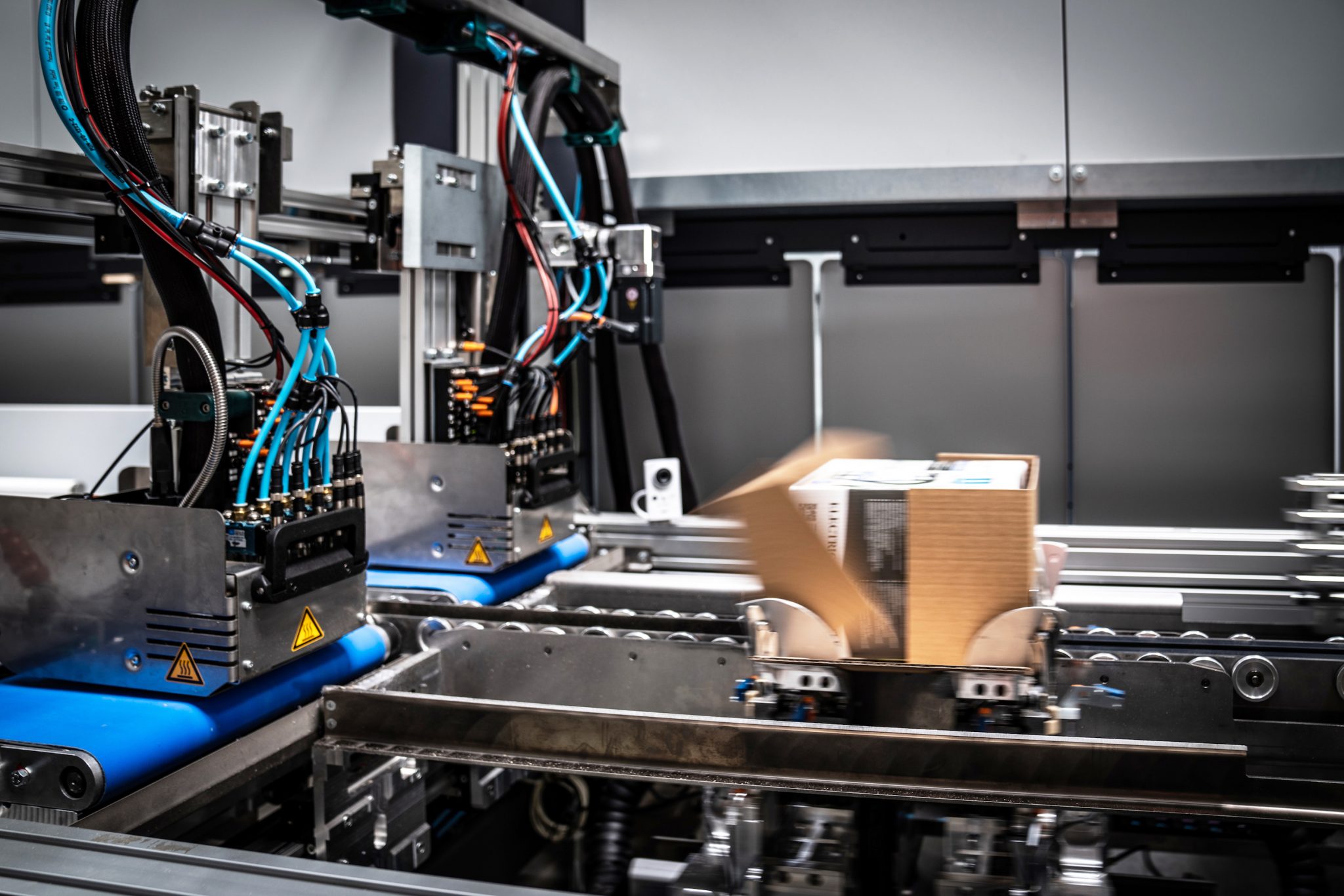KION Group says it has recorded strong order intake in the first half of 2020 thanks to the e-commerce boom, despite a 10% drop in revenue caused by the pandemic and a 50% year-on-year drop in earnings versus 2019 H1. The forklift hardware and automation specialist said that net income remains in positive territory. While it expects significant falls in its core industrial trucks sector, the fast-moving supply chain solutions arm, driving automation particularly in the ecommerce sector, is strongly up year on year.
Highlights of the statement are:
– Total value of order intake goes up by 4.8 percent to €4.400 billion in the first half of 2020, despite the coronavirus pandemic
– Revenue decreases by 10.0 percent to €3.927 billion due to the crisis
– Adjusted EBIT falls sharply to €204.8 million (H1 2019: €407.6 million)
– Adjusted EBIT margin declines from 9.3 percent to 5.2 percent
– Net income for the period remains in positive territory at €50.6 million
– Free cash flow amounts to minus €219.6 million in the first half of 2020 (H1 2019: minus €31.6 million), partly due to acquisitions
The full statement is reproduced below:
With its broad corporate strategy and comprehensive intralogistics portfolio, the KION Group has been able to stay on course even in the extremely difficult market conditions created by the global coronavirus pandemic. The Supply Chain Solutions (SCS) segment, with its focus on automation solutions, was able to build on the positive performance of previous quarters in the first half of 2020, and generated a strong boost in orders for the Group in the second quarter. The positive performance of the SCS segment was driven in particular by strong demand in the e-commerce and the food and beverage logistics sectors. Conversely, the current reluctance to invest that is being experienced in many industries hit new business in the Industrial Trucks & Services (IT&S) segment particularly hard.
“The strong order intake in the first six months of this challenging year shows that our broad product range and KION 2027 strategy have put us on the right course to navigate these choppy waters,” stressed Gordon Riske, Chief Executive Officer of KION GROUP AG. “The KION Group has a highly resilient business model. As an active full-service provider in more than 100 countries, we are in a position to successfully exploit opportunities even in a global crisis of this magnitude.” With an installed base of more than 1.5 million industrial trucks and over 6,000 installed warehouse logistics systems, the KION Group’s customers include companies in all industries and of all sizes on six continents.
The value of order intake for the KION Group rose by 4.8 percent to €4.400 billion in the first six months of 2020 (H1 2019: €4.197 billion). This growth was primarily due to the sharp rise in new orders in the SCS segment, particularly big-ticket orders at the end of the second quarter. Consolidated revenue fell by 10.0 percent, to €3.927 billion (H1 2019: €4.364 billion). This was mainly caused by the restrictions on operations resulting from the extensive lockdown measures in many geographical markets during the second quarter. Although adjusted EBIT fell by 49.8 percent to €204.8 million (H1 2019: €407.6 million) as a result of the lower revenue, the Group managed to contain the decline by swiftly implementing cost-cutting measures.
Net income for the period decreased to €50.6 million (H1 2019: €218.3 million) but remained in positive territory. Basic earnings per share stood at €0.46 (H1 2019: €1.87). Free cash flow was in negative territory at minus €219.6 million (H1 2019: minus €31.6 million), primarily due to the low level of EBIT, the change in working capital, and the acquisition in March of Digital Applications International Limited (DAI), a UK software company specializing in logistics automation solutions. Strict spending discipline, cost-cutting measures, and the postponement of some capital expenditure projects helped to counteract the negative effects.
Difficult global market
The global spread of coronavirus and the measures taken to contain the pandemic took a massive toll on the material handling market in the reporting period, in terms of both procurement and sales. This was reflected in the significant decrease in order intake in the global market for industrial trucks.
The number of new trucks ordered decreased to 706.4 thousand, a fall of 7.0 percent compared with the first half of 2019. The EMEA region (western Europe, eastern Europe, Middle East, and Africa) recorded the sharpest drop at
16.4 percent, while the Americas region (North, Central, and South America) saw a decline of 8.9 percent. In the APAC region (Asia-Pacific), however, orders went up slightly, by 1.4 percent. This was because the Chinese market bounced back significantly in the second quarter once the strict lockdown measures – which had been imposed earlier there, at the start of the year – were eased.
According to the KION Group’s assessment, the worldwide market for supply chain solutions was held back by the noticeable slowdown of the global economy and the resulting reluctance to invest. The KION Group observed a noticeable weakening – particularly of industries such as clothing and consumer durables – in the market for supply chain solutions, whereas the market sectors that are traditionally relevant to the KION Group, e-commerce and food supply chains, registered increases in demand. Overall, the rate of growth in the Supply Chain Solutions segment remained intact.
Segment performance in detail
In the Industrial Trucks & Services segment (industrial trucks, warehouse technology, and related services), the KION Group’s brand companies took orders for 88.9 thousand new trucks during the first half of 2020 – 18.5 percent below the figure for the first six months of 2019 (109.2 thousand). This decrease was more pronounced than the decrease in the global market as a whole due to the situation in EMEA, the main sales region, where the material handling market was hit particularly hard by the coronavirus pandemic in the first half of 2020. The decline in the segment’s order numbers was less severe in the APAC region.
The total value of order intake declined by 13.9 percent to €2.655 billion (H1 2019: €3.084 billion). The segment’s total revenue decreased by 14.1 percent to €2.705 billion (H1 2019: €3.147 billion) as a result of the contraction of demand in the new truck and service businesses and due to the restrictions on and disruption to production. A 21.0 percent fall in revenue in the new trucks business contrasted with a drop of just 6.3 percent in the service business. The proportion of the segment’s external revenue accounted for by the service business thus rose to 51.8 percent (H1 2019:
47.6 percent).
Adjusted EBIT amounted to €112.4 million (2019: €326.5 million). This reduction of 65.6 percent was due to the decrease in revenue and production inefficiencies caused by supply bottlenecks affecting procurement. The segment’s adjusted EBIT margin was 4.2 percent (H1 2019: 10.4 percent).
Despite the coronavirus pandemic, the Supply Chain Solutions segment saw a significant year-on-year improvement of 57.3 percent in its order intake to €1.744 billion (H1 2019: €1.109 billion). This was due in large part to big-ticket orders from e-commerce customers, including companies in North America and Europe.
Segment revenue, at €1.216 billion, was just above the prior-year figure (H1 2019: €1.211 billion). In the long-term project business (business solutions), temporary delays to projects as a result of restrictions on access to customers’ premises were the main reason for the 2.8 percent fall in revenue. By contrast, the service business continued to prove robust, recording revenue growth of 10.7 percent. As a result, the proportion of the segment’s external revenue accounted for by the service business increased to 25.8 percent (H1 2019: 23.4 percent).
The segment’s adjusted EBIT was almost unchanged year on year at €112.1 million (H1 2019: €111.8 million). At
9.2 percent, the adjusted EBIT margin also held steady (H1 2019: 9.2 percent).
Outlook
Compared with the forecasts made in the 2019 annual report, economic conditions have deteriorated substantially. Despite predicting a recovery following the collapse of economic output in the second quarter, the IMF anticipates that the economy will shrink by 4.9 percent over 2020 as a whole. This assessment is very uncertain. In a positive scenario, for example if effective methods of treatment are developed, the recovery in the second half of the year may be much more pronounced. Risks include, in particular, further outbreaks of the virus in regions that currently have low infection rates, which could result in the renewed shutdown of public life and economic activity. Moreover, the expansionary fiscal stimulus measures may not have the desired effect and could also harm the stability of the financial system.
The forward-looking statements and information given below are based on the Company’s current expectations and assessments against the backdrop of the very uncertain conditions that currently prevail. Consequently, they involve a relatively high number of risks and uncertainties. If a negative economic scenario were to materialize, the KION Group’s performance and profits would differ significantly from those in the outlook.
Sectoral conditions are mixed. The current negative growth rates are expected to continue to have a negative impact in the second half of the year, particularly in the Industrial Trucks & Services segment. Despite the adverse effects of the coronavirus pandemic, the market for supply chain solutions is likely to hold more or less steady owing to the sustained uptrend in e-commerce.
In light of uncertainty about how the pandemic will unfold, its likely duration, and its impact on the global economy and sectoral conditions, the Executive Board of the KION Group retracted the outlook for the 2020 financial year in March that had been published in the 2019 annual report.
At the time of preparation of this interim report, the assessment of the Group’s business performance over the remainder of this year was still very uncertain. Consequently, an outlook – including quantitative target ranges – for the main key performance indicators has not been provided for 2020. Instead, there is a qualitative comparative assessment of the predictions for these KPIs.
In light of the ongoing coronavirus pandemic, the KION Group anticipates, for the Group as whole, a noticeable decrease in order intake and a significant fall in revenue, adjusted EBIT, free cash flow, and ROCE compared with 2019.
In the Industrial Trucks & Services segment, the current reluctance to invest and the declining demand for services will have a significant negative impact. The KION Group therefore expects that order intake, revenue, and adjusted EBIT for 2020 will be down significantly year on year in the Industrial Trucks & Services segment.
Given the currently very encouraging level of orders in the Supply Chain Solutions segment, its order intake in 2020 is likely to be substantially higher than in 2019. Because there are considerable uncertainties about a possible return to lockdown measures, delays to project execution cannot be ruled out. Revenue and adjusted EBIT are therefore expected to be at a level more in line with that seen in 2019.







